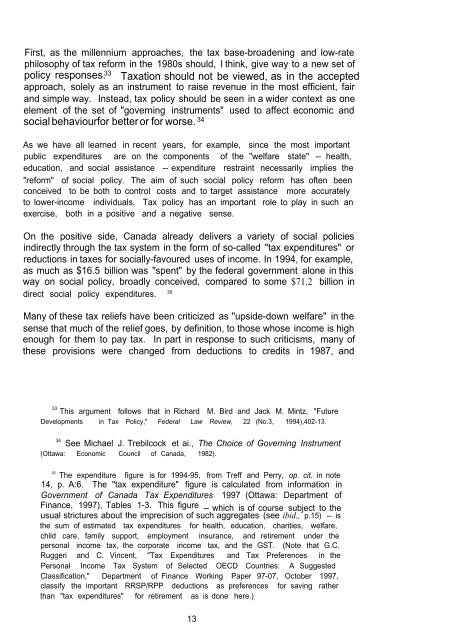Richard Bird - Institute for Public Economics - University of Alberta
Richard Bird - Institute for Public Economics - University of Alberta
Richard Bird - Institute for Public Economics - University of Alberta
You also want an ePaper? Increase the reach of your titles
YUMPU automatically turns print PDFs into web optimized ePapers that Google loves.
First, as the millennium approaches, the tax base-broadening and low-ratephilosophy <strong>of</strong> tax re<strong>for</strong>m in the 1980s should, I think, give way to a new set <strong>of</strong>policy responses. 33 Taxation should not be viewed, as in the acceptedapproach, solely as an instrument to raise revenue in the most efficient, fairand simple way. Instead, tax policy should be seen in a wider context as oneelement <strong>of</strong> the set <strong>of</strong> "governing instruments" used to affect economic andsocial behaviour<strong>for</strong> better or <strong>for</strong> worse. 34As we have all learned in recent years, <strong>for</strong> example, since the most importantpublic expenditures are on the components <strong>of</strong> the "welfare state" -- health,education, and social assistance -- expenditure restraint necessarily implies the"re<strong>for</strong>m" <strong>of</strong> social policy. The aim <strong>of</strong> such social policy re<strong>for</strong>m has <strong>of</strong>ten beenconceived to be both to control costs and to target assistance more accuratelyto lower-income individuals. Tax policy has an important role to play in such anexercise, both in a positive and a negative sense.On the positive side, Canada already delivers a variety <strong>of</strong> social policiesindirectly through the tax system in the <strong>for</strong>m <strong>of</strong> so-called "tax expenditures" orreductions in taxes <strong>for</strong> socially-favoured uses <strong>of</strong> income. In 1994, <strong>for</strong> example,as much as $16.5 billion was "spent" by the federal government alone in thisway on social policy, broadly conceived, compared to some $71.2 billion indirect social policy expenditures.35Many <strong>of</strong> these tax reliefs have been criticized as "upside-down welfare" in thesense that much <strong>of</strong> the relief goes, by definition, to those whose income is highenough <strong>for</strong> them to pay tax. In part in response to such criticisms, many <strong>of</strong>these provisions were changed from deductions to credits in 1987, and33 This argument follows that in <strong>Richard</strong> M. <strong>Bird</strong> and Jack M. Mintz, "FutureDevelopments in Tax Policy," Federal Law Review, 22 (No.3, 1994),402-13.34See Michael J. Trebilcock et ai., The Choice <strong>of</strong> Governing Instrument(Ottawa: Economic Council <strong>of</strong> Canada, 1982).35The expenditure figure is <strong>for</strong> 1994-95, from Treff and Perry, op. cit. in note14, p. A:6. The "tax expenditure" figure is calculated from in<strong>for</strong>mation inGovernment <strong>of</strong> Canada Tax Expenditures 1997 (Ottawa: Department <strong>of</strong>Finance, 1997), Tables 1-3. This figure -- which is <strong>of</strong> course subject to theusual strictures about the imprecision <strong>of</strong> such aggregates (see ibid., p.15) -- isthe sum <strong>of</strong> estimated tax expenditures <strong>for</strong> health, education, charities, welfare,child care, family support, employment insurance, and retirement under thepersonal income tax, the corporate income tax, and the GST. (Note that G.C.Ruggeri and C. Vincent, "Tax Expenditures and Tax Preferences in thePersonal Income Tax System <strong>of</strong> Selected OECD Countries: A SuggestedClassification," Department <strong>of</strong> Finance Working Paper 97-07, October 1997,classify the important RRSP/RPP deductions as preferences <strong>for</strong> saving ratherthan "tax expenditures" <strong>for</strong> retirement as is done here.)13



